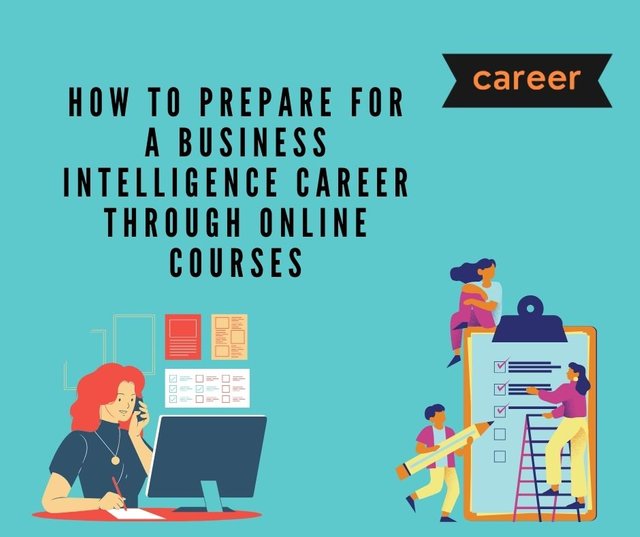In today's data-driven business landscape, Business Intelligence (BI) professionals are in high demand. Whether you're a recent graduate looking to kickstart your career or a seasoned professional aiming to upskill, online courses offer a convenient and effective way to prepare for a rewarding BI career. This guide will walk you through the steps to prepare for a Business Intelligence career through online courses.

Understand the Basics of Business Intelligence:
Before diving into online courses, it's essential to grasp the fundamentals of BI. Business Intelligence involves collecting, analyzing, and interpreting data to aid decision-making. Familiarize yourself with key BI concepts such as data warehousing, data visualization, and data analytics.
Why Choose a Career in Business Intelligence?
Choosing a career in Business Intelligence (BI) can be a wise and rewarding decision for several compelling reasons:
• High demand and competitive salaries
• Opportunities across diverse industries
• Continuous learning and growth
• Direct impact on business success
• Global job opportunities
• Analytical problem-solving
• Work-life balance
• Contribution to innovation
Roadmap for a Business Intelligence Career with Online Courses:
Assess Your Skillset -
Evaluate your current skills and identify areas that need improvement. BI professionals require a mix of technical and analytical skills. Determine whether you need to enhance your data analysis, SQL, or data visualization skills.
Choose the Right Online Courses -
Selecting the right business intelligence online course is crucial for your BI career preparation. Look for courses that align with your skill development needs. Some popular options include:
a. Data Analytics and Data Science courses: These courses cover statistical analysis, machine learning, and data manipulation tools like Python and R.
b. SQL and Database Management courses: SQL is the backbone of data manipulation, making it essential for BI professionals.
c. Data Visualization courses: Learn to create insightful visualizations using tools like Tableau, Power BI, or Python libraries like Matplotlib and Seaborn.
d. Business Intelligence Certification programs: These comprehensive programs often cover a wide range of BI tools and techniques.
Online Course Platforms -
Consider platforms like Syntax Technologies, Coursera, edX, Udacity, and LinkedIn Learning, which offer a wide array of BI-related courses. You can also explore specialized BI platforms like DataCamp and Domo University.
Build a Study Plan -
Create a structured study plan that outlines the courses you'll take, study hours, and deadlines. Consistency is key to mastering BI skills.
Master Essential Tools and Technologies -
To excel in Business Intelligence, you must become proficient in the tools and technologies vital for effective data work. These include widely used tools like Microsoft Power BI, Tableau, SQL, Python, R, and Data Warehousing. Look for online courses that provide comprehensive instruction on these tools and technologies. Many learning platforms offer specialized BI courses tailored to specific tools, such as "Microsoft Power BI for Data Science" or "Tableau Fundamentals."
Hands-On Practice -
Theory alone won't make you a BI expert. Apply what you've learned by working on real-world projects, even if they are personal or small in scale. This practical experience will boost your confidence and build your portfolio.
Networking and Forums -
Engage with the BI community by joining forums, LinkedIn groups, and attending virtual meetups. Networking can provide valuable insights and job opportunities.
Stay Updated –
The BI field is constantly evolving. Stay updated with the latest trends and technologies by following industry blogs, news sites, and participating in webinars.
Seek Certification –
Consider earning certifications like Certified Business Intelligence Professional (CBIP) or vendor-specific certifications like Tableau Desktop Specialist. Certifications can enhance your credibility and marketability.
Getting Interview-Ready –
After finishing your courses and assembling a strong portfolio, the next step is to begin applying for Business Intelligence positions. Prepare for technical interviews assessing your data analysis and problem-solving abilities. Consider enrolling in online courses that specialize in interview preparation – they can prove invaluable at this point."
Construct a Portfolio –
In the field of BI, practical experience holds significant value. Apply your newfound knowledge to real-world projects and craft a portfolio to exhibit your competencies to prospective employers. Numerous online courses include project-oriented assignments that can be incorporated into your portfolio."
Job Search and Internships –
Once you've acquired the necessary skills, start looking for BI job opportunities or internships to gain practical experience.
Conclusion:
Preparing for a Business Intelligence career through online courses is an achievable goal with the right strategy. By understanding the fundamentals, selecting the appropriate courses, and gaining practical experience, you'll be well on your way to a successful BI career. Stay committed to continuous learning and adapt to industry changes to excel in this dynamic field.